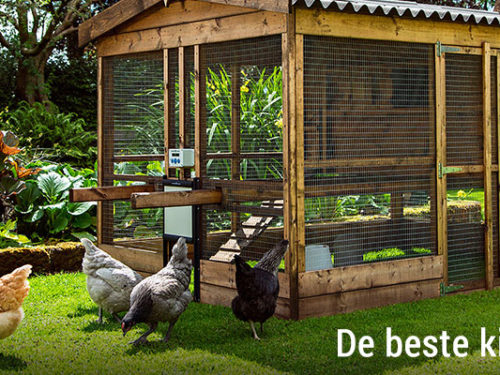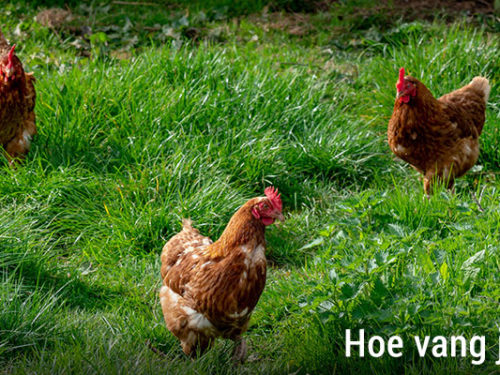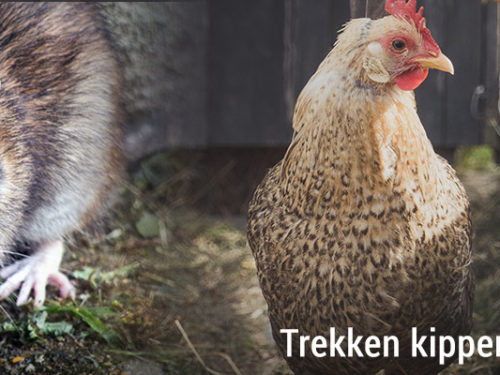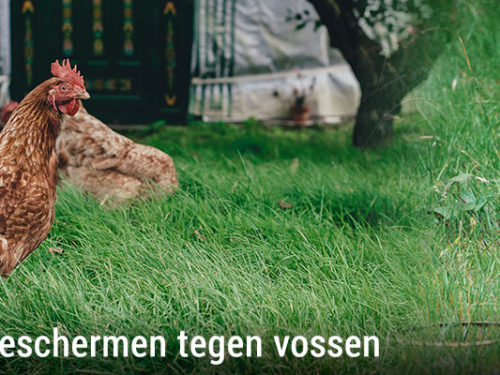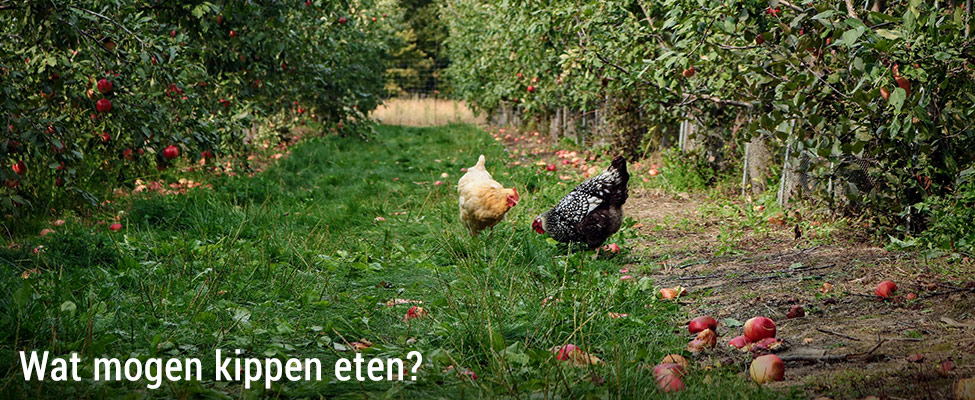
One of the most common questions that first chicken keepers us first ask what they need to perform their new litter. So, what can chickens eat? Read on to find out with what and how to feed your feathered friends …
Can chickens eat bananas?
Absolutely! Bananas are an excellent food source for your chickens! They are extremely high in vitamins A, C and B6 and also contain magnesium, iron, niacin and other essential trace elements. And the best part? Most chickens just love it – so feeding your chickens bananas is a great idea!
Can chickens eat grapes?
Yes – in moderation. Grapes are another important source of vitamins A and C, as well as the vitamin B complex, and they also contain important trace elements such as copper and calcium. However, they also have a very high sugar content, so make sure to feed your chickens only small amounts, at most once a week. It’s also important to roughly chop them first so your chickens can digest them more easily.
Can chickens eat apples?
Yes. Your chickens can also eat apples and applesauce. It is best to encourage them to cut to the digestive system , Apple Seeds do contain small amounts of cyanide, so try to eliminate them as possible.
Can chickens eat tomatoes?
Absolutely. Chickens love it! And they are also super healthy, rich in antioxidants, fiber and potassium, as well as vitamins C, K and B9.
Can chickens eat strawberries?
Moderation. Strawberries will promote health as they are packed with vitamins A, C and B9, as well as contain the anti-inflammatory compound called quercetin. However, they are also high in sugar, so use them more as an occasional treat for your girls.
Can chickens eat mushrooms?
Certainly, but in moderation. Provided they are not of a poisonous species (!), Chickens can eat mushrooms, although too much of this can strain their stomach.
Can chickens eat lettuce?
All varieties except iceberg lettuce. Iceberg lettuce can put a strain on your chicken’s stomach, but all other varieties are a healthy treat.
Can chickens eat celery?
Yes, and it is also a really good choice for them, with many beneficial vitamins and minerals. However, they do not like it, so it is best to chop it very small so that they still want to enjoy it
Can chickens eat grass?
Yes, just make sure that the grass has not been treated with chemicals and that it has been cut into short pieces. Eating long grass can cause a crop blockage in chickens, which is a condition in which the chicken’s crop becomes clogged and food digestion is compromised.
Can chickens eat cucumbers?
Cucumbers are a super healthy treat for your chickens, packed with vitamins and minerals. They also have antioxidant properties and are full of water to keep your litter hydrated!
Can chickens eat blackberries?
Yes, chickens are allowed to eat blackberries and they can really enjoy them!
Can chickens eat rice?
It depends on! Can chickens eat cooked rice? Yes. But never give them uncooked rice as it can expand in their stomach, causing blockages or even perforating the intestines. Opt for brown or wild rice if possible – white rice has very little nutritional value.
Can chickens eat cheese?
Moderation. Cheese is a great source of protein and calcium. But remember, your chickens cannot digest the proteins properly, so only feed it in small amounts.
Can chickens eat peppers?
You can feed your flock this fruit, but it is by no means a favorite! Do not give them the leaves, plants or flowers that contain the toxic compound solanine, which is also found in the green parts of the potatoes.
Can chickens eat blueberries?
Chickens love blueberries, which is great news because they are packed with vitamins, minerals and antioxidants!
Can chickens eat potato skins?
Chickens are allowed to eat potato skins – and potatoes – as long as you make sure you never give them the green parts, which contain the toxic chemical solanine. Leaves, flowers and plants should be avoided as they can be toxic to chickens.
Can chickens eat raisins?
In extremely small quantities! There are some studies showing that feeding your chickens too much raisins could lead to kidney failure. While not conclusive, it is certainly reason enough to limit their raisin consumption to an occasional treat. They are also high in sugar and so could lead to obesity if you feed your chickens too much.
Can chickens eat oranges?
They may, but they usually don’t like them very much, although these are super healthy for them! Therefore, mix them in a fruit salad to make sure your flock reaps their health benefits.
Can chickens eat melon?
Moderation. Chickens love melon. They can eat the flesh and seeds and peck at the skin. Just don’t give them too much or they could get diarrhea.
Can chickens eat peas?
Absolutely! Peas – and pea pods – are a healthy snack for chickens.
Can chickens eat mealworms?
Chickens can eat both fresh and dried mealworms, which are especially an added value for them when they are moulting. However, feed them in moderation as they have a high protein content.
Can chickens eat cauliflower?
Cauliflower is a healthy food for chickens, which can eat both the stems and the leaves.
Can chickens eat raspberries?
Yes! Chickens are allowed to eat raspberries.
Can chickens eat kiwifruit?
Although high in sugar, kiwifruit is a healthy treat for your chickens. But make sure you only give them in moderation.
Can chickens eat asparagus?
They certainly can! Although anecdotal evidence suggests they don’t like it that much. If you can get your chickens to pick up this healthy snack, make sure they don’t overeat, as it can affect the taste of their eggs.
Can chickens eat mango?
Yes, chickens can eat both the pulp and skin of mangoes.
Can chickens eat plums?
Moderation. Plums are high in sugar, so don’t overfeed your chickens! However, try to remove the seeds as they contain traces of cyanide.
Can chickens eat beets?
Yes! Chickens are allowed to eat both beet and beet leaves.
Can chickens eat cherries?
Boiled and uncooked cherries (make sure no sugar is added) are high in minerals and vitamins A, C, E and K. They also contain choline, which is essential for the health of the chickens.
Can chickens eat kale?
Absolutely! Kale is incredibly healthy for chickens!
Can chickens eat parsnips?
Yes, although they are not a fan of that. Shredded or chopped parsnips will be the preference of your flock.
What should chickens not eat?
There are so many different things chickens can – and should – eat that it can be easy to fall into the trap of thinking that chickens can eat just about anything. But that is certainly not the case, and there are many things you should never, ever give to your little friends. Here are some specific foods to avoid:
Avocado
Can chickens eat avocado? This is best avoided. While they are technically allowed to * eat * the flesh of the avocado, the skin, leaves, and stone contain a chemical called persin that is highly toxic to the chicken. So, to be on the safe side, it is best not to feed avocados to your chickens
Rhubarb
Can chickens eat rhubarb? No! Both the stem and leaves contain oxalic acid, which can be deadly to your flock.
Onions
Chickens should not eat onions because large amounts can cause hemolytic anemia, a condition that destroys red blood cells.
In addition to the specifics listed above, there are some general rules you should adhere to when feeding your flock. In general, you should avoid the following:
- Food rich in refined sugars. Just as they can cause obesity in humans, so can they in chickens.
- Salty foods – your chickens cannot digest large amounts of salt and too much salt can even kill them
- Moldy Food – Just as you shouldn’t eat moldy food, neither should your feathered girlfriends. Many types of mold are extremely poisonous!
- Anything with caffeine is prohibited. Caffeine is toxic to chickens, even in small amounts.
- Chocolate and alcohol – they may be a favorite of us humans, but they should never be given to chickens.
Remember, we absolutely DO NOT recommend that you feed your chickens food waste. That would contradict the guidelines and advice of the Animal and Plant Health Agency – you can read it here.
How much do chickens eat?
The average chicken eats about 700 grams of feed per week – a little more in the winter, a little less in the summer. Larger chickens eat more than the smaller ones.
Ze kunnen, met tussenpozen de hele dag worden gevoederd of je kunt de voederbakken de hele dag ophangen zodat de kippen kunnen eten wanneer ze maar willen. Het ophangen van de voederbakken is waarschijnlijk de gemakkelijkste keuze en het is ook een goede manier om te voorkomen dat de meer dominante kippen de anderen “pesten”! Zorg ervoor dat je meer dan één voederbak hebt als je meer dan zes kippen hebt en dat je ze ver uit elkaar plaatst. Op die manier kan een pestkop hen niet allebei bewaken!
En maak je geen zorgen, want over het algemeen zullen kippen zich niet overeten, dus je ziet ze waarschijnlijk niet de hele dag pikken.
Waar eten kippen?
Of het nu gaat om voer dat in het hok wordt opgehangen, of om verspreid voer terwijl ze in hun hok rondlopen, (of vrij), uw kipjes zullen met plezier pikken waar het voer zich ook bevindt. Het belangrijkste is om ervoor te zorgen dat de plek waar ze eten voor hen veilig en comfortabel is.
Bent u een ervaren kippenhouder met wijsheid om te delen? We willen graag weten wat u uw kipjes te eten geeft! Of misschien overweegt u voor het eerst kippen te houden en heeft u een prangende vraag? Ga dan naar het ChickenGuard Facebook profiel om in contact te komen – onze geweldige gemeenschap zal blij zijn om van u te horen!
Here at ChickenGuard we are passionate about everything poultry related. Our mission is to protect chickens from predators, with our innovative, high-quality products, which ensure lasting peace of mind for chicken farmers.
And here we have summarized everything in a What can Kippen Eat infographic.
Yes:
Bananas, Apples, Tomatoes, Celery, Grass, Cucumber, Blackberries, Blueberries, Oranges, Peas, Cauliflower, Raspberries, Asparagus, Mango, Red beets, Cherries, Kale, Parsnips;
Moderation:
Potato skins, strawberries, mushrooms, mealworms, peppers, lettuce, cheese, grapes, raisins, melon, plums, kiwis, rice;
No:
Avocado, Rhubarb, Onions.



